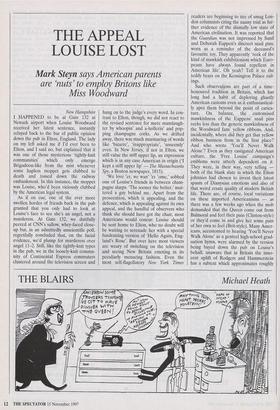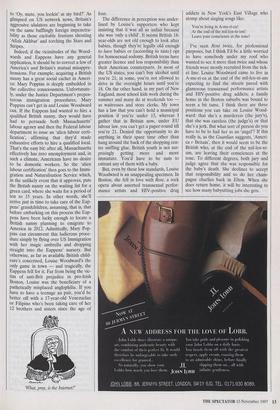THE APPEAL LOUISE LOST
Mark Steyn says American parents are 'nuts' to employ Britons like Miss Woodward New Hampshire I HAPPENED to be at Gate 132 at Newark airport when Louise Woodward received her latest sentence, instantly relayed back to the bar of public opinion down the pub in Elton, England. The lady on my left asked me if I'd ever been to Elton, and I said no, but explained that it was one of those mysterious `tightly-knit communities' which only emerge Brigadoon-like from the mist whenever some hapless moppet gets clubbed to death and tossed down the railway embankment. In this instance, the moppet was Louise, who'd been viciously clubbed by the American legal system.
As if on cue, one of the ever more swollen hordes of friends back in the pub grunted that you only had to look at Louise's face to see she's an angel, not a murderess. At Gate 132, we dutifully peered at CNN's sallow, whey-faced close- up but, in an admittedly unscientific poll, regretfully concluded that, on the facial evidence, we'd plump for murderess over angel 11-2. Still, like the tightly-knit types in the pub, we in the loosely-knit commu- nity of Continental Express commuters clustered around the television screen and hung on to the judge's every word. In con- trast to Elton, though, we did not react to the revised sentence for mere manslaugh- ter by whoopin' and a-hollerin' and pop- ping champagne corks. As we drifted away, there was much murmuring of words like 'bizarre', 'inappropriate', 'unseemly' even. In New Jersey, if not in Elton, we still value the stiff upper lip, an expression which is in any case American in origin (I kept a stiff upper lip' — The Massachusetts Spy, a Boston newspaper, 1815).
`We love 'er, we wan' er 'ome,' sobbed one of Louise's friends in between cham- pagne slurps. 'The sooner the better,' mut- tered a guy behind me. Apart from the prosecution, which is appealing, and the defence, which is appealing against its own appeal, and the handful of observers who think she should have got the chair, most Americans would concur: Louise should be sent home to Elton, who no doubt will be waiting to serenade her with a special fundraising version of 'Hello Again, Eng- land's Rose'. But over here most viewers are weary of switching on the television and seeing New Britain emoting in its peculiarly menacing fashion. Even the most self-flagellatory New York Times readers are beginning to tire of smug Lon- don columnists citing the nanny trial as fur- ther evidence of the dismally low state of American civilisation. It was reported that the Guardian was not impressed by Sunil and Deborah Eappen's discreet snail pins, worn as a reminder of the deceased's favourite toy. They apparently 'reek of the kind of mawkish exhibitionism which Euro- peans have always found repellent in American life'. Oh yeah? Tell it to the teddy bears on the Kensington Palace rail- ings.
Such observations are part of a time- honoured tradition in Britain, which has long had a habit of deploring ghastly American customs even as it enthusiastical- ly apes them beyond the point of carica- ture. On balance, the customised mawkishness of the Eappens' snail pins reeks less than the generic mawkishness of the Woodward fans' yellow ribbons. And, incidentally, where did they get that yellow ribbon business from in the first place? And who wrote 'You'll Never Walk Alone'? Even as they castigated American culture, the 'Free Louise' campaign's emblems were utterly dependent on it. They were, in their way, very telling both of the blank slate in which the Elton johnnies had chosen to invest their latest spasm of Dianysian emotions and also of that weird ersatz quality of modern British life. There are, of course, local variations on these imported Americanisms — as there was a few weeks ago when the mob demanded that the Queen come out from Balmoral and feel their pain (Clinton-style) or they'd come in and give her some pain of her own to feel (Brit-style). Many Amer- icans, accustomed to hearing 'You'll Never Walk Alone' as a genteel high-school grad- uation hymn, were alarmed by the version being bayed down the pub on Louise's behalf, unaware that in Britain the inno- cent uplift of Rodgers and Hammerstein has a subtext which approximates roughly to 'Oy, mate, you lookin' at my bird?' As glimpsed on US network news, Britain's aggressive ululators are beginning to take on the same bafflingly foreign impenetra- bility as those excitable Iranians shouting `Allah Aldibar' and torching the Stars and Stripes.
Indeed, if the vicissitudes of the Wood- wards and Eappens have any general application, it should be to correct a few of America's and Britain's mutual misappre- hensions. For example, acquiring a British nanny has a great social cachet in Ameri- ca: Mary Poppins is deeply embedded in the collective consciousness. Unfortunate- ly, under the Justice Department's prepos- terous immigration procedures, Mary Poppins can't get in and Louise Woodward can. If the Eappens had wanted to hire a qualified British nanny, they would have had to persuade both Massachusetts' labour agency and then the Federal labour department to issue an 'alien labour certi- fication', affirming that they'd made exhaustive efforts to hire a qualified local. That's the easy bit: after all, Massachusetts effectively has zero unemployment and, in such a climate, Americans have no desire to be domestic workers. So the 'alien labour certification' then goes to the Immi- gration and Naturalisation Service which, in the unlikely event that it approves, puts the British nanny on the waiting list for a green card, where she waits for a period of ten to 15 years. In other words, she'll arrive just in time to take care of the Eap- pens' grandchildren, assuming, that is, that before embarking on this process the Eap- pens have been lucky enough to locate a British nanny planning to emigrate to America in 2012. Admittedly, Mary Pop- pins can circumvent this ludicrous proce- dure simply by flying over US Immigration with her magic umbrella and dropping straight into the Eappens' nursery. But otherwise, as far as available British child- care's concerned, Louise Woodward's the only game in town — and tragically, the Eappens fell for it. Far from being the vic- tim of anti-Brit prejudice in pro-Irish Boston, Louise was the beneficiary of a pathetically misplaced anglophilia. If you have to have a teenage au pair, you'd be better off with a 17-year-old Venezuelan or Filipino who's been taking care of her 12 brothers and sisters since the age of `What, pray, is the Internet?' four.
The difference in perception was under- lined by Louise's supporters who kept insisting that it was all so unfair because she was 'only a child'. It seems British 18- year-olds are not old enough to look after babies, though they're legally old enough to have babies or (according to taste) opt for homosexual sodomy. British teens have greater licence and less responsibility than their American counterparts. In most of the US states, you can't buy alcohol until you're 21; in some, you're not allowed to drive in the overnight hours until you're 18. On the other hand, in my part of New England, most school kids work during the summer and many do at weekends too — as waitresses and store clerks. My town has a law that you can't hold a municipal position if you're under 13, whereas I gather that in Britain now, under EU labour law, you can't get a paper-round till you're 21. Denied the opportunity to do anything in their spare time other than hang around the back of the shopping cen- tre sniffing glue, British youth is not sur- prisingly getting more and more immature. You'd have to be nuts to entrust any of them with a baby.
But, even by these low standards, Louise Woodward is an unappealing specimen. In Boston, she fell in love with Rent, a rock opera about assorted transsexual perfor- mance artists and HIV-positive drug addicts in New York's East Village who stomp about singing songs like:
You're living in A-me-ri-ca!
At the end of the mil-len-ni-um! Leave your conscience at the tone!
I've seen Rent twice, for professional purposes, but I think I'd be a little worried to have somebody under my roof who wanted to see it more than twice and whose friends were mostly recruited from the tick- et line. Louise Woodward came to live in A-me-ri-ca at the end of the mil-len-ni-um expecting to find the streets paved with glamorous transsexual performance artists and HIV-positive drug addicts; a family home in the Boston suburbs was bound to seem a bit tame. I think there are three positions you can take on Louise Wood- ward: that she's a murderess (the jury's), that she was careless (the judge's) or that she's a jerk. But what sort of person do you have to be to hail her as an 'angel'? If this really is, as the Guardian suggests, 'Ameri- ca v Britain', then it would seem to be the British who, at the end of the mil-len-ni- um, are leaving their consciences at the tone. To different degrees, both jury and judge agree that she was responsible for the baby's death. She declines to accept that responsibility and so do her cham- pagne charlies back in Elton. When she does return home, it will be interesting to see how many babysitting jobs she gets.











































































 Previous page
Previous page